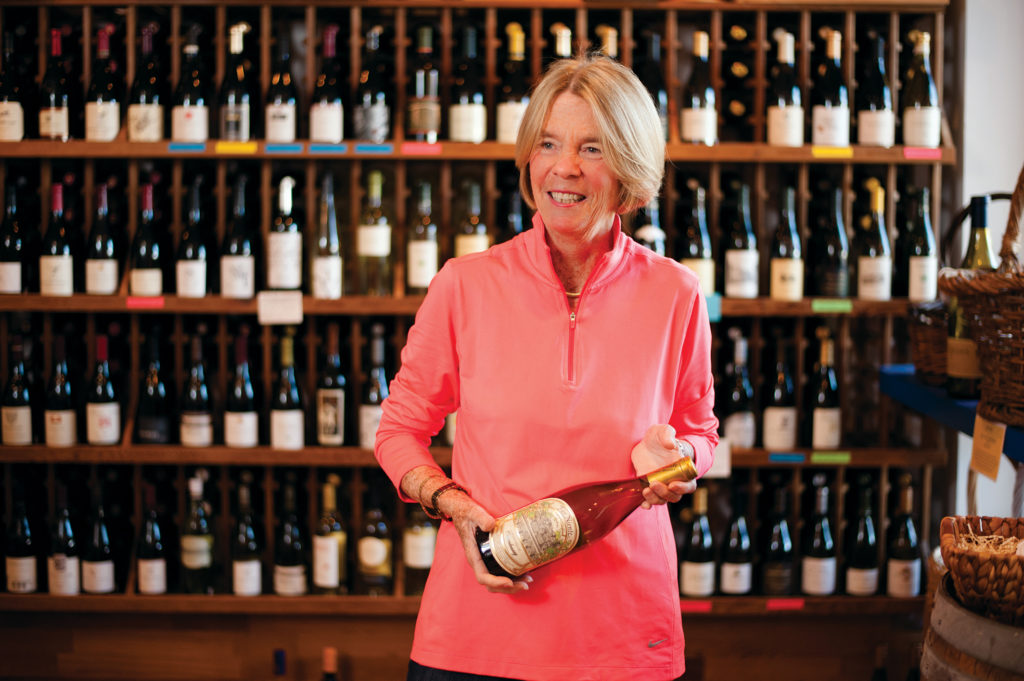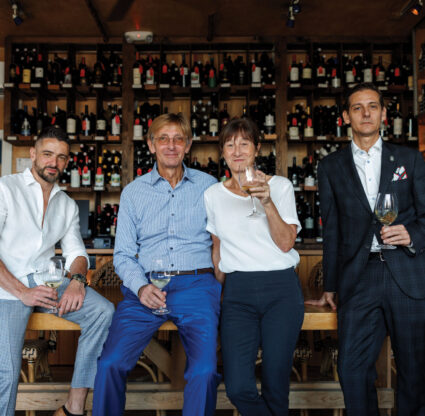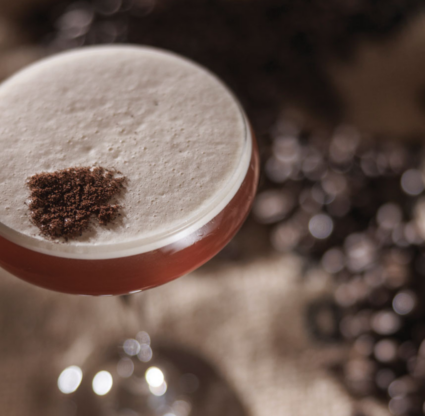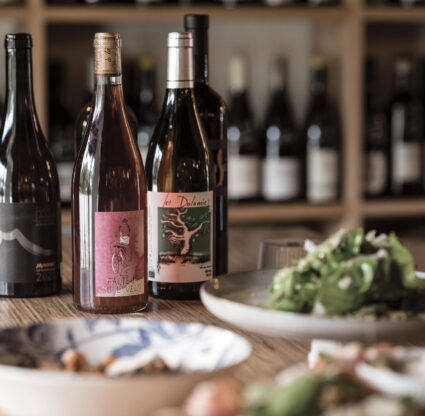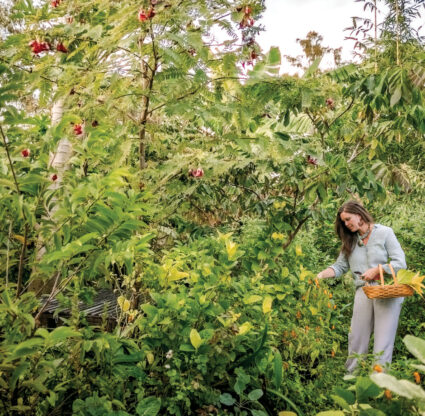When she was in her early 20s, Sukie Honeycutt was on the cover of Rolling Stone.
“The back cover,” she’s quick to say, humbly. “And they featured 16 albums.”
But still.
Today, she’s just as much of a rock star. As co-owner of Ridgway Bar & Grill and Tony’s Off Third as well as her eponymous wine store, Sukie’s Wine Shop, and Bayside Seafood Grill & Bar in The Village Shops on Venetian Bay, Honeycutt is arguably the preeminent voice in the Naples wine scene. Yet ask where her passion for wines began—An early cultivation? A refined palate from a young age?—and she just laughs.
“I didn’t know anything when I started,” Honeycutt admits. “I knew Lancers and Mateus, and I may have had Pouilly Fuissé a couple of times.”
Today, Honeycutt’s wine lists and shops feature some of the most sought-after bottles in production, and she’s on the must-visit list of global vintners. Ellie Sexton, a field manager for one of the major wine distributers in Southwest Florida who has worked with Honeycutt for the last 15 years, puts it this way:
“I was introducing Sukie to a new person in my world last week, and I said, ‘She’s very revered.’ By that I mean she’s had loyal customers for years, and they go to her for advice. There are collectors who ask her opinion on what to put in their wine cellars or what to serve at their dinners. They trust her. I’ve met people from other parts of the country as I travel, and when I mention Naples, Sukie’s name always comes up.”
Honeycutt is built slim and small, but she carries a large presence. When a customer stops in to buy wine from Tony’s Off Third, she springs to the register. She’s effusive, talking about wine nonstop—the mineral quality of the soil in which the grapes for a particular wine were grown, the way a label does or does not do justice to the wine inside, the rules of shipping bottles across state lines. There’s such passion and energy in her movements and voice that it’s easy to imagine her fronting a rock band. In fact, Honeycutt draws a connection between her dual roles as restaurateur and wine aficionado and her time on stage.
“I loved to sing,” she says. “I loved to perform. And that carries over into this industry. There’s a lot of performance.”
But even the most outgoing performers still need time off.
“I have three fabulous Chihuahuas,” she says, laughing. “They’re there when I get home, and they don’t require me to talk to them. At that point, I’m all talked out. They come and cuddle while I watch TV and sip a glass of wine.”
During the day, Honeycutt is dressed casually in shorts or jeans, a white button-up top and her trademark New Balance sneakers.
“I wear comfortable shoes,” she says.
For good reason. On an average day, Honeycutt clocks 5 to 6 miles on her circuit between her office above Ridgway, the restaurant and the wine shop next door.
“I wear two hats,” she explains. “I’m a restaurateur, and I’m a wine retailer. My time is weighted equally between those two hats.”
Born and raised in Pittsburgh, Honeycutt first came to work in restaurants after her music career. She’d been touring and recording albums with her folk rock band, The Repairs, but the tour dates and the late-night hours put a strain on her marriage. So, Honeycutt quit the music business and went to graduate school to study American literature.
“I was working my way through grad school waiting tables,” she says, “and it was never embarrassing for me. I loved it. It was great interacting with all those people, and the money was good.”
She eventually became a manager at an upscale restaurant in Bridgeport, Connecticut, where she worked until she saw that it was time to move on.
“I realized I was at a dead end there,” she says. “I couldn’t grow anymore, and I wasn’t learning anything at that point.”
Honeycutt and her husband had decided to part ways, and she knew she wanted to leave Connecticut. She just wasn’t sure where she’d go.
“I went on vacation with a girlfriend to Sarasota and Disney World with Naples as the last stop. I fell in love with Naples and thought it was a wonderful town. So I stayed another week, getting to know the town, scoping out the restaurants. Then I went back to Connecticut, to my job, and said, ‘I’m going to try to get a job in a restaurant in a small town called Naples.’ This was 1979. Naples was still small.”
Honeycutt was hired at The Chef’s Garden, in the space Ridgway Bar & Grill currently occupies, when it was owned by Tony Ridgway and another partner.
“One of the things that intrigued me the most was that this was a fine dining experience with a fabulous wine list,” she says of The Chef’s Garden.
Ridgway asked her during her interview, “What do you know about wines?” and Honeycutt replied, “Next to nothing, but I’m dying to learn.”
And learn she did. Honeycutt read voraciously and set out to expand her palate.
“I bought books, I tasted a lot, I encouraged the distributors to bring samples to me. A lot of people leave a little wine in their bottle at the end of the evening, and Tony would encourage me, ‘Take this bottle of wine home and see what you think.’ It became a passion that totally enveloped me. I wanted to learn about it as much as I could.”
A year into working at The Chef’s Garden, Honeycutt took over writing the restaurant’s wine list. She expanded its wine-by-the-glass program and introduced new and innovative varieties to the offerings. Over time, Ridgway’s business partners moved out of the restaurant business, and eventually Ridgway and Honeycutt combined forces.
“In the late ’90s when one of our partners from Bayside Grill was bought out and moved to New England and another partner left to retire, Sukie and I were the remaining partners, and we were left with not the prettiest business picture,” Ridgway says. “I couldn’t have asked for a better partner to work through the difficulties with, to keep everything positive. I’m a food guy—I write the menus, I set the standards for the cuisine—but Sukie is the person who makes the restaurant look good. You can talk about her wine knowledge, which is extraordinary, you can talk about her taste buds, which are extraordinary, you can talk about her connections in the wine business, which are extra extraordinary, but the most important part to me is that she and I implicitly trust each other.”
“We complement each other well,” Honeycutt says of her business relationship with Ridgway. “He’s left-handed and I’m right-handed. He’s left-brained and I’m right-brained. He’s financially oriented and I’m creative. He’s a very important part of my life, and a very dear friend. We’ve been partners nearly 40 years. That’s unheard of in the restaurant business.”
When important winemakers pass through town—Piero Antinori, Michael Mondavi, Dave Phinney—they make a point of seeing Honeycutt, and the walls of Tony’s Off Third are decorated with framed photographs of Honeycutt and famous vintners.
“I’ve stuck with it,” Honeycutt says of her rise to the top. “I know a lot of people in town who become sommeliers or wine managers for various restaurants, but after a while they just stop. I’ve stuck with it for 40 years. I never allow myself to stop learning. I learn from my staff, I learn from my distributer reps. I’m always tasting new wines.”
People often come into her shops seeking her help with a wine purchase, and she has a particular protocol she follows. First on that list: She’s cautious not to put forward her own wine tastes.
“I have to be careful with that,” she admits. “For instance, I do not like an oaky, buttery chardonnay. When a customer comes in and says, ‘I need some help. I need to buy a gift for someone,’ the first question I ask is, ‘How much do you want to spend?’ so I can bring them to the right area of the store. Then I ask, ‘What do they drink? Do they love barrel-fermented wine?’ If they don’t like wine with a lot going on like big chardonnays, then I will steer them toward a wine like a white wine from Oregon. Because of the cool climate of Oregon, their wines tend to be more Burgundian. They have more finesse and are a little lighter in alcohol. That’s the real key with the customer. I can’t say, ‘This is what I like or don’t like.’”
Still, she does have her own preferences.
“I love pinot noir so much I have three separate sections in Tony’s Off Third,” Honeycutt says. “A value section, a shelf section and a credenza with 21 pinot noirs in it that are highly allocated.”
In fact, allocated wines—wines available in limited quantities only to certain retailers or restaurants—are a bit of her specialty.
“You can’t find these allocated wines in big-box stores,” she says, “and, quite frankly, they’re in a price range where those stores don’t want to handle these bottles.”
Yet even the non-allocated wines on her shelves are special.
“I carry wines that are not on people’s radars,” she says, “bottles they haven’t seen at Costco or Publix. I do ‘Sukie Recommends’ cards about why I’ve selected the wine to be on the floor and giving a snapshot of what the wine tastes like. Most are not California wines. I have an Italian section, an Australian section, South American wines, a Spanish section. I carry more Spanish wines than any wine shop in town. I love them because their grapes are unique. They have a completely different taste profile and are lower in alcohol, and they’re inexpensive.”
Although her restaurants and wine shops are lauded by people who know and understand wine, Honeycutt comprehends that part of her job is demystifying the wine world for those with less expertise.
“That’s one of the reasons why we have two wine lists at Ridgway,” she says. “The base list has about 100 wines, and the master list has in excess of 400. Everything you see in this store is on the master list. Wine is very technical. I find that customers don’t want to get too technical. I know a lot about these things, but I wouldn’t even pretend to know everything. The wine world changes every single day.”
Despite the vast depth of her knowledge, Honeycutt is quick to point out that she’s not a sommelier.
“I have no formal training,” she says. “However, I feel that my 35 years of working with wine has put me beyond a sommelier on so many levels. The first experience as a sommelier is learning how to open wine and how to pour it. I was doing that 30 years ago. I think it’s great because it forces you to study, but I didn’t need to be forced. I craved wine knowledge.”
And though she works long hours, Honeycutt has no plans to give it up soon.
“A classmate visiting Naples recently said to me, ‘Everyone in our class is retired. When are you going to retire?’ I said, ‘It’s not even on my radar screen. Why would I want to retire when I’m having so much fun?’ I love my life. It’s what I do. It’s who I am.”

